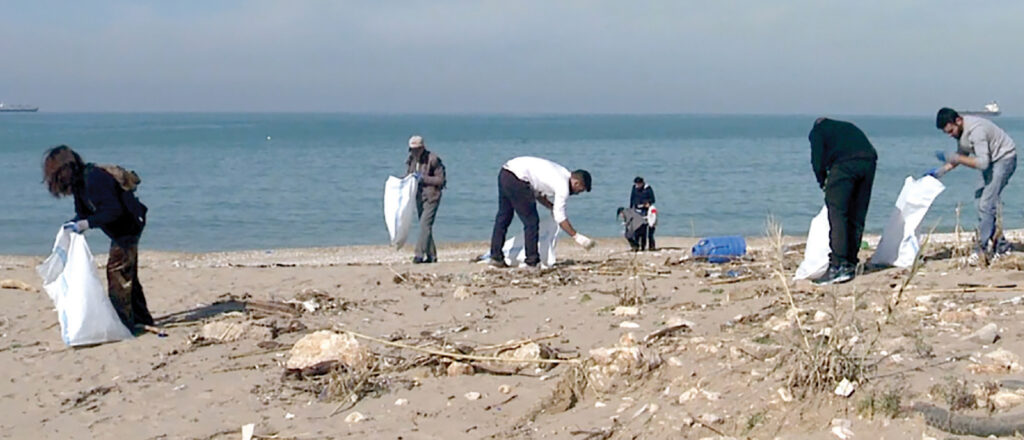High in the mountains of Lebanon, one of the country’s most precious resources is cached: water, in the form of fresh snow.


“We have a lot of water, even though we are in the Middle East,” says Nazih Ghattas, a member of Rotary Club of Baabda, Lebanon, RID 2452. In that regard, he says, “we are the richest country in the whole area.”
Yet thousands of feet below those white-capped peaks, Lebanon’s residents, including more than one million Syrian refugees, struggle to find clean water to drink or bathe in.
The runoff from the mountains flows into decaying pipelines, sewage-choked wells, and rivers thick with pollution. People who drink the water, or swim in it, often end up with stomach or skin ailments that keep them from school or work.
And while clean water can be purchased from private sources, it doesn’t come cheap: The average family in Beirut spends up to 15 per cent of its monthly income on water.
“There are huge hills of waste outside Beirut,” says André Marti, a member of Rotary Club of Willisau, Switzerland, RID 1980. “And what is even worse, all the wastewater from industry is going into the rivers, and people take water out of the rivers for irrigation, for agriculture. So in the end, all those contaminants are in the food.”
Ghattas, Marti, and other Rotarians are working to improve Lebanon’s water situation in cooperation with the Swiss nonprofit CEWAS (short for International Centre for Water Management Services), which links sustainable water, sanitation, and resource management with business development. They are encouraging and supporting the country’s entrepreneurs: “People are more committed to providing long-term solutions when they can generate income from these solutions,” Marti says.

The idea for the entrepreneurship project stemmed from a seminar Marti attended as a new Rotarian in 2016, during which he learned about The Rotary Foundation’s commitment to water, sanitation, and hygiene programmes. He immediately thought of CEWAS, an organisation he was familiar with through his work in business development.
The Rotary clubs of Lebanon were already focused on water projects. In 2013, District 2452 Governor Jamil Mouawad and other district leaders launched a multiyear water project, involving all of Lebanon’s Rotary clubs, that will provide water tanks and filters to every school in the country.
Another problem Lebanon faces is high unemployment. Creating opportunities while improving access to clean water seemed like a perfect project for Rotary and CEWAS to work together. But they needed to persuade enough potential entrepreneurs to focus on water and sanitation.
“We do not have a lot of entrepreneurs in this field, because it does not generate quick money,” Ghattas says. In addition, he notes that many people are more interested in developing businesses for the whole Middle East. “This would be very local.”
In other words, the Rotarians needed to prime the pump.
So RC Willisau partnered with CEWAS and the Lebanese Rotary clubs of Baabda, Saida, and Tripoli Cosmopolis on a $233,000 project to recruit, train, and support local entrepreneurs as they developed innovative water and sanitation business ideas. Funded by contributions from the Swiss Agency for Development and Cooperation, RC Willisau, RID 2452, CEWAS and its partners, and a Rotary Foundation global grant, the project kicked off in February 2018.
To recruit participants, CEWAS held workshops throughout the country at which would-be entrepreneurs presented and discussed ideas for addressing the national water crisis. “They worked for a day on these ideas, and then at the end, experts chose some of them for the main programme,” Marti explains. “The intention was to find 15 startups, and they had many more than that.”
From March through July, the participants took classes on entrepreneurship, and from August through November, they received individual coaching with local business experts.
The experts who provided the group education and individual coaching were a mix of Rotarians and CEWAS partners. “How this country works, how they have to negotiate with authorities and navigate politics to move forward with their projects — this is the important expertise that Rotary members can provide,” Marti says. “They got the water expertise and sustainable resource management expertise from CEWAS.” Crucially, the Lebanese Rotary clubs provided connections to banks and other financial institutions willing to make loans to new entrepreneurs.
In November, six of the project participants were chosen to present their ideas in Beirut before a jury of water and business experts, including Marti, as well as local media and an audience of several hundred Rotarians and others. The winners — Ralph and Georgio Diab of Plastic Beach, a plastics recycling business — received $5,000 to support their enterprise. Plastic Beach, which designed and built a portable plastic shredder that fits in a van, collects plastic waste from small businesses such as restaurants for a monthly fee. Shredding waste on location makes transporting it more cost-efficient. The company also provides job opportunities by organising beach cleanups.
And the entrepreneurial training project isn’t over. “The intention is to have an annual programme,” Marti says, with funding from private sponsorships and Swiss development agencies.
Meanwhile, the Lebanese Rotarians’ project to install water tanks and filters is evolving. “We will finish distribution to all the schools in 2019 and have started with another phase of the project: awareness,” says Ahmad Husseini, a member of RC Tripoli-Maarad who has been closely involved with the project since its inception. “We’re training the teachers about water and sanitation and hygiene inside their schools. Next year we will start with water filtration in prisons.”
This is how Rotarians are bringing clean water to Lebanon: steadily, patiently, knowing that even a tiny stream will eventually become a great river.
© The Rotarian






